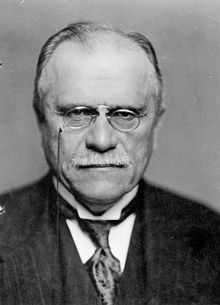Louis-Philippe Brodeur
| The Hon. Louis-Philippe Brodeur | |
|---|---|
 | |
| Member of the Canadian Parliament for Rouville | |
| In office 1891–1911 | |
| Preceded by | George Auguste Gigault |
| Succeeded by | Rodolphe Lemieux |
| Puisne Justice of the Supreme Court of Canada | |
| In office August 11, 1911 – October 10, 1923 | |
| Preceded by | Désiré Girouard |
| Succeeded by | Arthur Cyrille Albert Malouin |
| 13th Lieutenant Governor of Quebec | |
| In office October 31, 1923 – January 1, 1924 | |
| Monarch | George V |
| Governor General | The Viscount Byng of Vimy |
| Premier | Louis-Alexandre Taschereau |
| Preceded by | Charles Fitzpatrick |
| Succeeded by | Narcisse Pérodeau |
| Personal details | |
| Born | August 21, 1862 Belœil, Lower Canada |
| Died | January 1, 1924 (aged 61) Spencer Wood, Sillery, Quebec |
| Political party | Liberal |
Louis-Philippe Brodeur, PC QC baptised Louis-Joseph-Alexandre Brodeur (August 21, 1862 – January 1, 1924) was a Canadian parliamentarian and public servant.
Born in Beloeil, Quebec, he was first elected to the Canadian House of Commons in the 1891 election as Liberal Member of Parliament (MP) for Rouville, Quebec. He represented the riding continuously until his retirement prior to the 1911 election.
Brodeur was a firm supporter of Sir Wilfrid Laurier and came from a Rouges family. His father fought in the Lower Canada Rebellion of 1837, and his grandfather was killed in the Rebellion's Battle of Saint-Charles.
As a young man, Brodeur studied law and engaged in journalism for Liberal newspapers such as la Patrie and L'Électeur before becoming editor of Le Soir. He was first elected to the Canadian House of Commons at the age of 29. After the Liberals won the 1896 election, Brodeur was appointed deputy speaker. He became Speaker of the Canadian House of Commons following the 1900 election. He was appointed as a Queen's Counsel in 1899.


In 1904, he was appointed to the Laurier Cabinet as Minister of Inland Revenue where he introduced anti-trust legislation to protect tobacco farmers from the monopolistic practices of the American Tobacco Company.
In 1906, he was promoted to Minister of Marine and Fisheries and reorganized the Montreal Harbours Commission and instituted reforms in the department to reduce patronage and corruption.
Brodeur was a member of the Canadian delegation to the 1907 Imperial Conference in London, and also helped negotiate a trade treaty with France.
In 1910, he became Minister of the Naval Service and was responsible for introducing legislation to create the Canadian Navy. This signified a move towards Canadian independence from Britain. It was opposed by the Conservative Party, which preferred Canada's participation in the British Navy. By the end of his term, the new Navy consisted of 233 sailors and two cruisers, one on each coast. The policy of creating a Canadian Navy was also opposed by French-Canadian nationalists such as Henri Bourassa who feared that the Canadian Navy would only be used as a device to engage Canada in British wars.
Prior to the 1911 election, Brodeur retired from politics and was appointed by Laurier to a seat on the Supreme Court of Canada. He retired from the court in 1923 to accept an appointment as the 13th Lieutenant Governor of Quebec. He died on New Year's Day 1924 in Quebec City.
Family
Louis-Philippe Brodeur married Emma Brillon, daughter of J. R. Brillon, of Belœil, P.Q., in June 1887.[1] Their son, Victor, attained the rank of Rear Admiral in the Royal Canadian Navy. Victor's son Nigel attained the rank of Vice Admiral.
References
- ↑ Morgan, Henry James Types of Canadian women and of women who are or have been connected with Canada : (Toronto, 1903)
External links
| Wikimedia Commons has media related to Louis-Philippe Brodeur. |
- Supreme Court of Canada biography
- "Louis-Philippe Brodeur". Dictionary of Canadian Biography (online ed.). University of Toronto Press. 1979–2005.
- Louis-Philippe Brodeur – Parliament of Canada biography
| ||||||||||||||||||||
| |||||||||||||||||||||||||||||
| ||||||||||||||||||||
| ||||||||||||||
| ||||||||||||||
| ||||||||